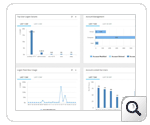Saipem's servers affected by Shamoon malware
On December 10, 2018, the Italian oil-services company Saipem reported a cyberattack on its servers in the Middle East,India,U.K.as well as in Italy.The attack has impacted 400 servers in Saudi Arabia,the United Arab Emirates,Kuwait,and Scotland.
Saipem’s head of digital and innovation, Mauro Piasere, identified that the attack originated in Chennai, India. As a precautionary measure, Saipem has temporarily shut down the affected servers to assess the scale of the attack. Fortunately, there was no loss of data since all their systems have backups. At the time of issuing the press release, Saipem said it's in the process of notifying the concerned authorities about the incident and is working on restoring its servers.
Don't want to make the news for the wrong reasons? Download ManageEngine Log360, the tool that can help combat internal and external security attacks.
How ManageEngine can help in such incidents.
Log360, our comprehensive SIEM solution, can help your organization:
- Detect cross-site scripting (XSS) attacks, malicious file installations, DoS attacks, SQL injection, and more with its real-time correlation capability. The solution also notifies you instantly about attempted and successful attacks, and provides detailed investigation reports to prevent future attacks.
- Spot potential intrusions or unauthorized network access attempts by comparing your network's log data with the data from the global IP threat database and STIX/TAXII threat feed processors of Log360.
- Detect potential insider threats with the user behavior analytics engine powered by machine learning, which creates a baseline of normal activities that are specific to each user and notifies security personnel instantly when there is a deviation from this norm.
- Monitor user activity within a database; account and permission changes in database servers; and more.
Get started with Log360.

Latest Ransomware attacks
Latest Data breach attacks
Latest Email Phishing attacks
Latest DoS and DDoS attacks
Latest Brute force attack
Latest Advanced persistent threat (APT)
